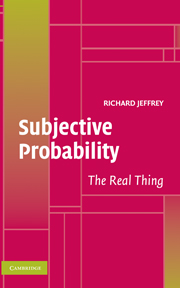1 - Probability Primer
Published online by Cambridge University Press: 05 June 2012
Summary
Yes or no: Was there once life on Mars? We can't say. What about intelligent life? That seems most unlikely, but again, we can't really say. The simple yes-or-no framework has no place for shadings of doubt, no room to say that we see intelligent life on Mars as far less probable than life of a possibly very simple sort. Nor does it let us express exact probability judgments, if we have them. We can do better.
Bets and Probabilities
What if you were able to say exactly what odds you would give on there having been life, or intelligent life, on Mars? That would be a more nuanced form of judgment, and perhaps a more useful one. Suppose your odds were 1:9 for life, and 1:999 for intelligent life, corresponding to probabilities of 1/10 and 1/1000, respectively. (The colon is commonly used as a notation for “/”, division, in giving odds–in which case it is read as “to”.)
Odds m:n correspond to probability m/m+n
That means you would see no special advantage for either player in risking one dollar to gain nine in case there was once life on Mars; and it means you would see an advantage on one side or the other if those odds were shortened or lengthened. And similarly for intelligent life on Mars when the risk is a thousandth of the same ten dollars (1 cent) and the gain is 999 thousandths ($9.99).
- Type
- Chapter
- Information
- Subjective ProbabilityThe Real Thing, pp. 1 - 28Publisher: Cambridge University PressPrint publication year: 2004



